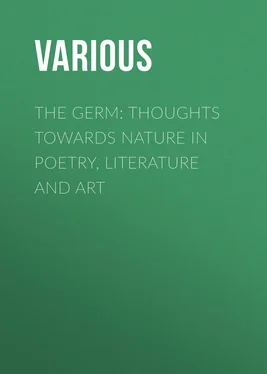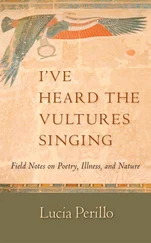Various - The Germ - Thoughts towards Nature in Poetry, Literature and Art
Здесь есть возможность читать онлайн «Various - The Germ - Thoughts towards Nature in Poetry, Literature and Art» — ознакомительный отрывок электронной книги совершенно бесплатно, а после прочтения отрывка купить полную версию. В некоторых случаях можно слушать аудио, скачать через торрент в формате fb2 и присутствует краткое содержание. Жанр: foreign_prose, foreign_antique, на английском языке. Описание произведения, (предисловие) а так же отзывы посетителей доступны на портале библиотеки ЛибКат.
- Название:The Germ: Thoughts towards Nature in Poetry, Literature and Art
- Автор:
- Жанр:
- Год:неизвестен
- ISBN:нет данных
- Рейтинг книги:3 / 5. Голосов: 1
-
Избранное:Добавить в избранное
- Отзывы:
-
Ваша оценка:
- 60
- 1
- 2
- 3
- 4
- 5
The Germ: Thoughts towards Nature in Poetry, Literature and Art: краткое содержание, описание и аннотация
Предлагаем к чтению аннотацию, описание, краткое содержание или предисловие (зависит от того, что написал сам автор книги «The Germ: Thoughts towards Nature in Poetry, Literature and Art»). Если вы не нашли необходимую информацию о книге — напишите в комментариях, мы постараемся отыскать её.
The Germ: Thoughts towards Nature in Poetry, Literature and Art — читать онлайн ознакомительный отрывок
Ниже представлен текст книги, разбитый по страницам. Система сохранения места последней прочитанной страницы, позволяет с удобством читать онлайн бесплатно книгу «The Germ: Thoughts towards Nature in Poetry, Literature and Art», без необходимости каждый раз заново искать на чём Вы остановились. Поставьте закладку, и сможете в любой момент перейти на страницу, на которой закончили чтение.
Интервал:
Закладка:
Then sleep the seasons, full of might;
While slowly swells the pod,
And rounds the peach, and in the night
The mushroom bursts the sod.
The winter falls: the frozen rut
Is bound with silver bars;
The white drift heaps against the hut;
And night is pierced with stars.
Dream Land
Where sunless rivers weep
Their waves into the deep,
She sleeps a charmed sleep;
Awake her not.
Led by a single star,
She came from very far,
To seek where shadows are
Her pleasant lot.
She left the rosy morn,
She left the fields of corn,
For twilight cold and lorn,
And water-springs.
Thro' sleep, as thro' a veil,
She sees the sky look pale,
And hears the nightingale,
That sadly sings.
Rest, rest, a perfect rest,
Shed over brow and breast;
Her face is toward the west,
The purple land.
She cannot see the grain
Ripening on hill and plain;
She cannot feel the rain
Upon her hand.
Rest, rest, for evermore
Upon a mossy shore,
Rest, rest, that shall endure,
Till time shall cease;—
Sleep that no pain shall wake,
Night that no morn shall break,
Till joy shall overtake
Her perfect peace.
Songs of One Household
She fell asleep on Christmas Eve.
Upon her eyes' most patient calms
The lids were shut; her uplaid arms
Covered her bosom, I believe.
Our mother, who had leaned all day
Over the bed from chime to chime,
Then raised herself for the first time,
And as she sat her down, did pray.
Her little work-table was spread
With work to finish. For the glare
Made by her candle, she had care
To work some distance from the bed.
Without, there was a good moon up,
Which left its shadows far within;
The depth of light that it was in
Seemed hollow like an altar-cup.
Through the small room, with subtle sound
Of flame, by vents the fireshine drove
And reddened. In its dim alcove
The mirror shed a clearness round.
I had been sitting up some nights,
And my tir'd mind felt weak and blank;
Like a sharp strengthening wine, it drank
The stillness and the broken lights.
Silence was speaking at my side
With an exceedingly clear voice:
I knew the calm as of a choice
Made in God for me, to abide.
I said, “Full knowledge does not grieve:
This which upon my spirit dwells
Perhaps would have been sorrow else:
But I am glad 'tis Christmas Eve.”
Twelve struck. That sound, which all the years
Hear in each hour, crept off; and then
The ruffled silence spread again,
Like water that a pebble stirs.
Our mother rose from where she sat.
Her needles, as she laid them down,
Met lightly, and her silken gown
Settled: no other noise than that.
“Glory unto the Newly Born!”
So, as said angels, she did say;
Because we were in Christmas-day,
Though it would still be long till dawn.
She stood a moment with her hands
Kept in each other, praying much;
A moment that the soul may touch
But the heart only understands.
Almost unwittingly, my mind
Repeated her words after her;
Perhaps tho' my lips did not stir;
It was scarce thought, or cause assign'd.
Just then in the room over us
There was a pushing back of chairs,
As some who had sat unawares
So late, now heard the hour, and rose.
Anxious, with softly stepping haste,
Our mother went where Margaret lay,
Fearing the sounds o'erhead—should they
Have broken her long-watched for rest!
She stooped an instant, calm, and turned;
But suddenly turned back again;
And all her features seemed in pain
With woe, and her eyes gazed and yearned.
For my part, I but hid my face,
And held my breath, and spake no word:
There was none spoken; but I heard
The silence for a little space.
My mother bowed herself and wept.
And both my arms fell, and I said:
“God knows I knew that she was dead.”
And there, all white, my sister slept.
Then kneeling, upon Christmas morn
A little after twelve o'clock
We said, ere the first quarter struck,
“Christ's blessing on the newly born!”
Hand and Soul
“Rivolsimi in quel lato
Là 'nde venia la voce,
E parvemi una luce
Che lucea quanto stella:
La mia mente era quella.”
Before any knowledge of painting was brought to Florence, there were already painters in Lucca, and Pisa, and Arezzo, who feared God and loved the art. The keen, grave workmen from Greece, whose trade it was to sell their own works in Italy and teach Italians to imitate them, had already found rivals of the soil with skill that could forestall their lessons and cheapen their crucifixes and addolorate , more years than is supposed before the art came at all into Florence. The pre-eminence to which Cimabue was raised at once by his contemporaries, and which he still retains to a wide extent even in the modern mind, is to be accounted for, partly by the circumstances under which he arose, and partly by that extraordinary purpose of fortune born with the lives of some few, and through which it is not a little thing for any who went before, if they are even remembered as the shadows of the coming of such an one, and the voices which prepared his way in the wilderness. It is thus, almost exclusively, that the painters of whom I speak are now known. They have left little, and but little heed is taken of that which men hold to have been surpassed; it is gone like time gone—a track of dust and dead leaves that merely led to the fountain.
Nevertheless, of very late years, and in very rare instances, some signs of a better understanding have become manifest. A case in point is that of the tryptic and two cruciform pictures at Dresden, by Chiaro di Messer Bello dell' Erma, to which the eloquent pamphlet of Dr. Aemmster has at length succeeded in attracting the students. There is another, still more solemn and beautiful work, now proved to be by the same hand, in the gallery at Florence. It is the one to which my narrative will relate.
This Chiaro dell' Erma was a young man of very honorable family in Arezzo; where, conceiving art almost, as it were, for himself, and loving it deeply, he endeavored from early boyhood towards the imitation of any objects offered in nature. The extreme longing after a visible embodiment of his thoughts strengthened as his years increased, more even than his sinews or the blood of his life; until he would feel faint in sunsets and at the sight of stately persons. When he had lived nineteen years, he heard of the famous Giunta Pisano; and, feeling much of admiration, with, perhaps, a little of that envy which youth always feels until it has learned to measure success by time and opportunity, he determined that he would seek out Giunta, and, if possible, become his pupil.
Having arrived in Pisa, he clothed himself in humble apparel, being unwilling that any other thing than the desire he had for knowledge should be his plea with the great painter; and then, leaving his baggage at a house of entertainment, he took his way along the street, asking whom he met for the lodging of Giunta. It soon chanced that one of that city, conceiving him to be a stranger and poor, took him into his house, and refreshed him; afterwards directing him on his way.
Читать дальшеИнтервал:
Закладка:
Похожие книги на «The Germ: Thoughts towards Nature in Poetry, Literature and Art»
Представляем Вашему вниманию похожие книги на «The Germ: Thoughts towards Nature in Poetry, Literature and Art» списком для выбора. Мы отобрали схожую по названию и смыслу литературу в надежде предоставить читателям больше вариантов отыскать новые, интересные, ещё непрочитанные произведения.
Обсуждение, отзывы о книге «The Germ: Thoughts towards Nature in Poetry, Literature and Art» и просто собственные мнения читателей. Оставьте ваши комментарии, напишите, что Вы думаете о произведении, его смысле или главных героях. Укажите что конкретно понравилось, а что нет, и почему Вы так считаете.












